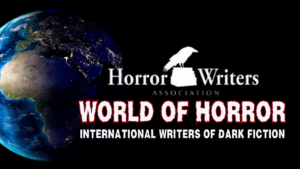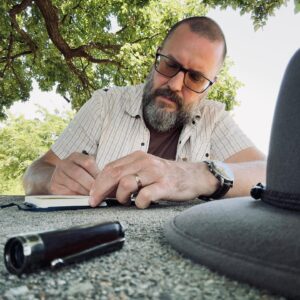World of Horror: Interview with J. Ashley Smith


J. Ashley Smith is a British-Australian author of dark fiction and co-host of the Let The Cat In podcast. His first book, The Attic Tragedy, won the Shirley Jackson Award. Other stories have won the Ditmar Australian Shadows and Aurealis awards. He lives with his wife and two sons beneath an ominous mountain in the suburbs of North Canberra, gathering moth dust, tormented by the desolation of telegraph wires. You can find him at spooktapes.net, performing amazing experiments in electronic communication with the dead. His debut collection, The Measure of Sorrow, is out now from Meerkat Press.
What was it about the horror genre that drew you to it?
Horror was my first love; the first books I bought for myself as a child of ten or eleven were all horror. My dad was a big sci-fi reader, and my mum was all about the murder mystery, so my house growing up was piled with mass-market paperbacks of one genre or another. I would go into town with my friends on Saturday afternoon and buy second-hand horror books from the market: Stephen King, James Herbert, Shaun Hutson. By that age, I had already been to too many funerals, death lay all about me like the shadow of some thing too vast to be comprehended in its entirety. And horror spoke to me, gave a language to the terrible and incomprehensible like no other genre.
Is there a horror tradition in your country, in your culture? A taste for horror, a market? Not necessarily literature; perhaps oral tradition too.
I’m an ex-pat Englishman, living in Australia, so I find it hard to talk about tradition or even culture. Not because of some lack in those countries (or, I hope, in myself), but because, having left one in favour of the other, I’m not sure I belong anywhere anymore. I’m in between. Both countries have a deep strangeness when viewed from that inside-outside perspective. And both have their own history of horrors. Modern England, in my experience at least, is steeped in brutality—even in seemingly tranquil Cambridge, where I grew up, I learned to get around by quiet back streets to avoid random acts of violence. And this violence isn’t isolated to nighttime high streets after the pubs close: it was exported to terrible effect throughout Britain’s history of empire. Modern Australia is founded on a shadow history of British violence to the country’s First Nations peoples, and to the country itself—the attempted wholesale export of a way of life suited to Northern Europe that simply wouldn’t take here, not without force. Not that horror is necessarily synonymous with violence, but its threat, its effect, its legacy, are all rich seams within the genre.
The horror tradition in England goes back to the genre’s earliest seeds: Mary Shelley’s Frankenstein, Robert Louis Stevenson’s Dr. Jekyll and Mr Hyde. But horror’s roots in that region go much deeper, back to the myths and fairy tales of old Europe. And here, the storytelling traditions of Indigenous Australia go back many tens of thousands of years.
Who are some of your favorite characters in horror, internationally and/or in your own culture?
One of my favourite books of Australian horror—one of my favourite books, full stop—is Kaaron Warren’s first novel, Slights. The protagonist, Stevie, is a brilliant and unforgettable character, with a voice to die for. She is Australian from head to foot, but uniquely so—not a bit like the stereotypes best exported as visions of Australia: the two famous Micks—Mick Dundee (as in Crocodile…) and Mick Taylor (from Wolf Creek). Stevie is quietly, authentically herself: wickedly funny and with a mean streak a mile wide, which may or may not tend towards actual evil.
Do you make a conscious effort to include characters and settings from your country in your writing, and if so, what do you want to portray?
I don’t know how much of a conscious decision I make, but certainly most of my stories have distinctly Australian or English settings and are populated with characters from those countries. Stories to me are very much of a place—they’re rarely free-floating, an idea that can be transposed anywhere. The flavour of a story, the imaginative tone, comes almost entirely from where it’s set, the local culture (however diffuse), the voice. Where the conscious decision comes in, I suppose, is in choosing not to set stories outside of my experience. I’m much more interested in, and my imagination is more strongly activated by, deep immersion in and understanding of where I am and where I’ve been. I love the distinctness, the unique regional voice of those places and people—it’s the specificity of tone that brings a story to life for me, much more so than the mere idea.
But I have to be careful, too. I’m very aware, in the case of Australia, that I did not grow up here, that my history is not rooted in this place. What I am conscious of, keenly, is not writing as a tourist—wowed by simple difference or imposed otherness. That way lies stereotyped characters, superficial settings. Similarly, I recognise that my England is now an England of the memory and of the imagination, detached from direct experience. I can write from my past there with a kind of authority and authenticity of voice, but I can’t project that onto the England of today.
What has writing horror taught you about the world and yourself?
That we live in a vibrant, complex and ultimately mysterious world, filled with wonder and horror. That we—individually and as a species—are capable of terrible atrocities and extraordinary acts of kindness; exquisite, destructive selfishness and soaring, transcendent creativity. Writing horror has become for me almost a Zen practice: a way of seeing and not turning away from things as they really are. I’ve learned I am a fundamentally anxious person, afraid—if I look at it closely enough—of almost anything. Writing horror teases out those fears from the roiling darkness, breaks them down on the page into something I can control, something I can understand. And each time I finish a story I become a little lighter, a little more free.
I’ve learned, too, that there is incredible kindness and support within the horror community. A kind of strength and depth and compassion that comes from facing our fears, if only in the imagination.
How have you seen the horror genre change over the years? And how do you think it will continue to evolve, both in the U.S. and in your country?
Although I was to some extent brought up on horror in the eighties, from my late teens onwards I was a much more catholic reader, inhaling almost anything from any genre that I found in thrift and secondhand book shops. I didn’t return to it in any kind of focused way until a bit over ten years ago. I found, to my delight, that it had broadened to encompass a huge range of perspectives, tones and influences, pushing its own boundaries in every conceivable direction. The most exciting development for me across that time—which I hope is no longer a trend but the new norm—is the vast range of voices across the genre, expressing new fears, or ancient ones in a new way. It has revitalised horror, and will, I believe, continue to do so for generations of writers and readers.
How do you feel the International horror writing community has been represented thus far in the market and what hopes do you have for representation going forward?
While there are slow improvements in the breadth of world horror being published (including some excellent recent anthologies), the U.S. is still very much dominant. From the outside, it can seem impenetrable, and that can be dispiriting. There may be a thriving local horror scene (as in Australia), but publishing opportunities are few, and local small-press publishers often don’t get attention outside their own shores.
Having said that, I think the appetite is changing. Readers want fresh voices, and many U.S. publishers—especially the smaller presses—are taking a chance on overseas authors. My last three books were published by Atlanta-based Meerkat Press, who have a number of other Australian authors in their stable. But even if you get your books on the shelves in the U.S., there’s a tyranny of distance that makes it hard to support their release. COVID helped a bit with the rise in acceptance of video conferencing platforms and online events, but ultimately it’s not the same. If you want to connect, you’ve got to be there in person. It’s easy for authors outside the U.S. to be overlooked—we have to shout that much louder in order to be heard.
Who are some international horror authors you would recommend?
From Australia: Kaaron Warren, Aaron Dries, Joanne Anderton, Alan Baxter, Kirstyn McDermott, Robert Hood, J.S. Breukelaar, Matthew R. Davis (and on and on).
I’m a big fan, too, of Japanese horror and love the work of Junji Ito, Koji Suzuki, Natsuo Kirino, Ryu Murakami.
For a wider perspective, a great starting point is the The Valancourt Book of World Horror anthology series. Really fantastic stories from a diverse array of countries, from Senegal to Spain, from Finland to the Philippines.
What is one piece of advice you would give horror authors today?
“Be yourself,” as Oscar Wilde is supposed to have said. “Everyone else is already taken.”
And to the writers from your country out there who are just getting started, what advice would you give them?
Write from where and who you are. Focus deeply on the world immediately around you, your own personal history and the roots of your direct experience—there’s depth and power and magic there.
Let go of the idea of originality; let go of cleverness. Every story has already been told—but not by you.



